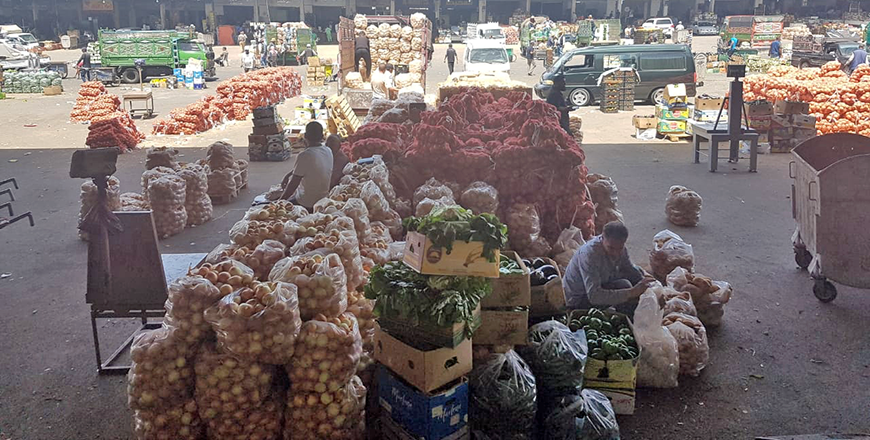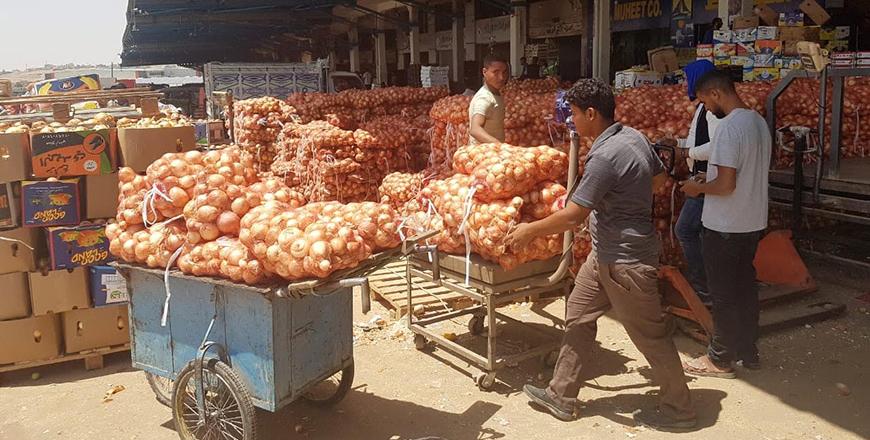You are here
Agricultural production sufficient to cover Kingdom’s needs, exports — Kharabsheh
By Bahaa Al Deen Al Nawas - Apr 14,2020 - Last updated at Apr 14,2020

In spite of the problems that face the agriculture sector under the current exceptional circumstances, overall production remains sufficient for the Kingdom’s needs and exports, Agriculture Minister Saleh Kharabsheh said on Tuesday (Photo by Amjad Ghsoun)
AMMAN — In spite of the problems that face the agriculture sector under the current exceptional circumstances, overall production remains sufficient for the Kingdom’s needs and exports, Agriculture Minister Saleh Kharabsheh said on Tuesday.
To meet demand during the fasting month of Ramadan, farms in the Shafa area will supply more produce than the Jordan Valley, Kharabsheh said.
The minister said that on Monday he met with sector representatives, including importers, exporters, Jordan Valley officials and date palm farmers, among others.
“There are no core problems facing any of the parties. Although the curfew imposed special circumstances, major issues have been resolved,” the minister told The Jordan Times over the phone.
Over the past five days, around 25,000 permits have been issued for farmers and the ministry has allowed the movement of agricultural machinery without permits, Kharabsheh said, noting that the whole production chain is currently operative, including compost plants, pesticides, machinery and wrapping among many.
President of the General Union of Jordanian Farmers Odeh Rawashdeh explained that the Shafa area includes farms in Mafraq, Irbid, east Amman and east Madaba, where summer crops are produced, noting that the next season will dependent on those areas, in addition to areas west of Maan and Jafer, located in the south-eastern part of the Kingdom.
“The health and safety of our farmers and citizens are our top priorities, and we are working on keeping produce clean and safe for consumption, as well as to strike a balance between prices citizens will pay and the costs farmers will incur during the upcoming period,” Rawashdeh added.
Jordan Valley Farmers Union President Adnan Khaddam reiterated the problems faced by farmers due to gusts on March 13, when storms that reached a speed of 120 kilometres per hour caused damage to the crops.
Khaddam suggested that financial support be provided to farmers directly instead of through the Agricultural Credit Corporation to facilitate the measures and conditions required to obtain the necessary finances for recovery from the damage they suffered during the storm and the curfew, imposed as a preventive measure to combat the spread of COVID-19.
Agriculture stakeholders in Irbid on Monday said that this year’s rainfall signals hope for a good agricultural season.
Ahed Abaidat, head of Koforsoum Agricultural Society, said that this year’s summer cultivation produced higher yields, thanks to the abundant rainfall during the wet season.
Earlier on Sunday, Kharabsheh said the ministry plans to construct a database to improve its care for the agricultural sector and its workers.
According to the minister, the database is compatible with the country’s efforts to preserve the effectiveness of various agricultural sector fields to successfully combat the exceptional circumstances imposed by the coronavirus pandemic, the Jordan News Agency, Petra, reported at the time.
Related Articles
AMMAN — Agriculture stakeholders in Irbid on Monday said that this year’s rainfall, totalling 100 per cent of the Kingdom’s annual average p
AMMAN — The mounting challenges faced by the agricultural sector, including changing weather patterns and rising production costs have left
AMMAN — The Agriculture Ministry plans to construct a database to improve its care for the agricultural sector and its workers, Minister of
















